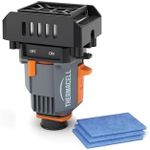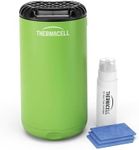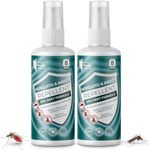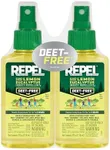Buying Guide for the Best Mosquito Repellents
Choosing the right mosquito repellent is essential for ensuring your comfort and safety, especially in areas where mosquitoes are prevalent. The right repellent can help prevent mosquito bites, which can transmit diseases such as malaria, dengue, and Zika virus. When selecting a mosquito repellent, it's important to consider various factors such as the active ingredients, duration of protection, form of the repellent, and any additional features that may be beneficial for your specific needs. Here are some key specifications to consider when choosing a mosquito repellent.Active IngredientsThe active ingredient in a mosquito repellent is the chemical that repels mosquitoes. Common active ingredients include DEET, picaridin, oil of lemon eucalyptus, and IR3535. DEET is known for its long-lasting protection and effectiveness, making it suitable for high-risk areas. Picaridin is a good alternative to DEET, offering similar protection without the strong odor. Oil of lemon eucalyptus is a natural option, but it may not last as long as synthetic chemicals. IR3535 is another synthetic option that is effective and gentle on the skin. Choose an active ingredient based on your preference for natural versus synthetic options and the level of protection you need.
Duration of ProtectionThe duration of protection indicates how long the repellent will be effective after application. This is important because it determines how often you need to reapply the product. DEET-based repellents can offer protection for up to 12 hours, while picaridin and IR3535 typically provide protection for 6-8 hours. Natural repellents like oil of lemon eucalyptus may last for about 2-4 hours. Consider how long you will be exposed to mosquitoes and choose a repellent that matches the duration of your activities.
Form of RepellentMosquito repellents come in various forms, including sprays, lotions, wipes, and wearable devices. Sprays are easy to apply and can cover large areas of skin quickly. Lotions provide a more controlled application and can be less messy. Wipes are convenient for on-the-go use and can be easily packed in a bag. Wearable devices, such as bracelets or clip-ons, offer a hands-free option but may not provide as comprehensive protection. Choose a form that fits your lifestyle and application preferences.
Skin SensitivitySome people have sensitive skin that can react to certain chemicals in mosquito repellents. If you have sensitive skin, look for products that are labeled as hypoallergenic or designed for sensitive skin. Natural repellents may also be gentler on the skin, but it's important to test a small area first to ensure there is no adverse reaction. Consider your skin type and any known allergies when selecting a repellent.
Additional FeaturesSome mosquito repellents come with additional features such as water resistance, pleasant scents, or added moisturizers. Water-resistant repellents are ideal for outdoor activities involving water, such as swimming or hiking in humid conditions. Pleasant scents can make the repellent more enjoyable to use, while added moisturizers can help keep your skin hydrated. Consider any additional features that may enhance your experience and choose a repellent that offers those benefits.














